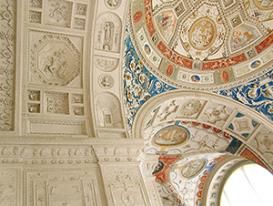This book project conceptualizes stucco as a central element of visual culture in early modern Europe. Overturning views of stucco as a marginal, cheap fiction of marble, this study positions it as early modern new media: a protean, shape-shifting substance that enabled new forms. This modest lime-and-stone mixture was reconceptualized as a chic new material; used by painters, sculptors and architects, stucco defies conventional divisions of scholarship by medium, and it further functioned as a reflexive meta-material. The project spans the 15th–17th centuries with a focus on Bramante and Raphael, whose brilliant technical and conceptual reformulation launched an international vogue, and introduced stucco into elite cultural discourse. Analyzing how this metamorphic material engaged ideas from natural philosophy, alchemy, and theology provides a new understanding of its formative role in early modern culture, and a striking illustration of how art and technology developed in a dialectical relationship with science and philosophy.

